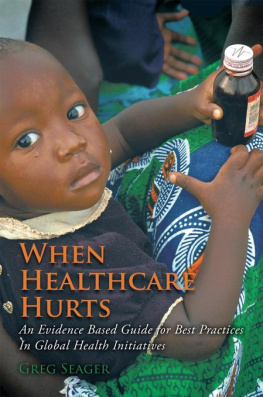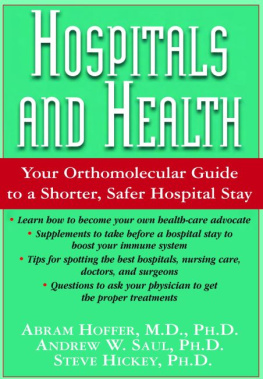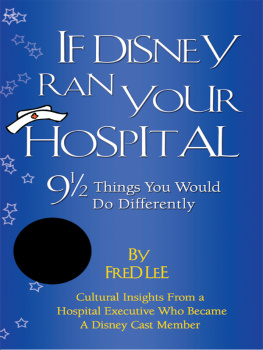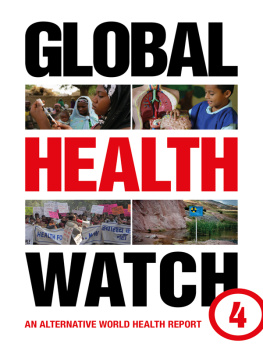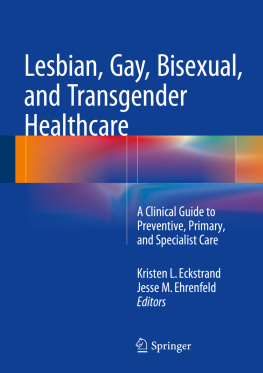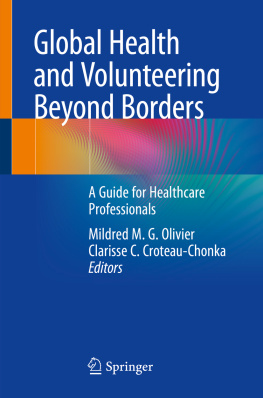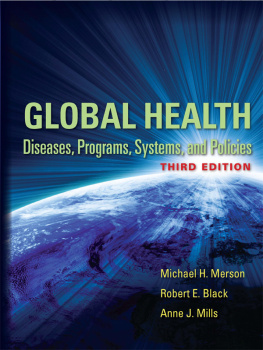Greg Seager - When Healthcare Hurts: An Evidence Based Guide for Best Practices in Global Health Initiatives
Here you can read online Greg Seager - When Healthcare Hurts: An Evidence Based Guide for Best Practices in Global Health Initiatives full text of the book (entire story) in english for free. Download pdf and epub, get meaning, cover and reviews about this ebook. year: 2012, publisher: AuthorHouse, genre: Romance novel. Description of the work, (preface) as well as reviews are available. Best literature library LitArk.com created for fans of good reading and offers a wide selection of genres:
Romance novel
Science fiction
Adventure
Detective
Science
History
Home and family
Prose
Art
Politics
Computer
Non-fiction
Religion
Business
Children
Humor
Choose a favorite category and find really read worthwhile books. Enjoy immersion in the world of imagination, feel the emotions of the characters or learn something new for yourself, make an fascinating discovery.
- Book:When Healthcare Hurts: An Evidence Based Guide for Best Practices in Global Health Initiatives
- Author:
- Publisher:AuthorHouse
- Genre:
- Year:2012
- Rating:4 / 5
- Favourites:Add to favourites
- Your mark:
- 80
- 1
- 2
- 3
- 4
- 5
When Healthcare Hurts: An Evidence Based Guide for Best Practices in Global Health Initiatives: summary, description and annotation
We offer to read an annotation, description, summary or preface (depends on what the author of the book "When Healthcare Hurts: An Evidence Based Guide for Best Practices in Global Health Initiatives" wrote himself). If you haven't found the necessary information about the book — write in the comments, we will try to find it.
Any and all proceeds from this book are used to support the work of Christian Health Service Corps missionaries serving in hospitals and health programs around the world.
Greg Seager: author's other books
Who wrote When Healthcare Hurts: An Evidence Based Guide for Best Practices in Global Health Initiatives? Find out the surname, the name of the author of the book and a list of all author's works by series.
When Healthcare Hurts: An Evidence Based Guide for Best Practices in Global Health Initiatives — read online for free the complete book (whole text) full work
Below is the text of the book, divided by pages. System saving the place of the last page read, allows you to conveniently read the book "When Healthcare Hurts: An Evidence Based Guide for Best Practices in Global Health Initiatives" online for free, without having to search again every time where you left off. Put a bookmark, and you can go to the page where you finished reading at any time.
Font size:
Interval:
Bookmark:
WHEN
HEALTHCARE
HURTS
An Evidence Based Guide for Best Practices In
Global Health Initiatives
GREG SEAGER

AuthorHouse
1663 Liberty Drive
Bloomington, IN 47403
www.authorhouse.com
Phone: 1-800-839-8640
2012 by Greg Seager. All rights reserved.
No part of this book may be reproduced, stored in a retrieval system, or transmitted by any means without the written permission of the author.
Published by AuthorHouse 06/28/2012
ISBN: 978-1-4685-8121-8 (sc)
ISBN: 978-1-4685-8120-1 (hc)
ISBN: 978-1-4685-8119-5 (e)
Library of Congress Control Number: 2012906534
Any people depicted in stock imagery provided by Thinkstock are models, and such images are being used for illustrative purposes only.
Certain stock imagery Thinkstock.
Because of the dynamic nature of the Internet, any web addresses or links contained in this book may have changed since publication and may no longer be valid. The views expressed in this work are solely those of the author and do not necessarily reflect the views of the publisher, and the publisher hereby disclaims any responsibility for them.
This book is a resource in a fast changing evolving field. WHO and other Standards in the book are likely to change and evolve over time so please consult original source documents referenced in this book to assure you are following the most current recommendations. The authors, publisher, and reviewers accept no liability for any loss, cost, claim, or expense arising from the use of any data contained in this book.
This book is dedicated to the healthcare professionals who have chosen to spend their lives serving the poor as career medical missionaries through the Christian Health Service Corps.
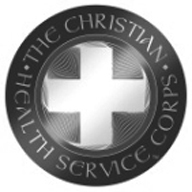
www.healthservicecorps.org
Any and all proceeds from this book are used to support the work of Christian Health Service Corps missionaries serving in hospitals and health programs around the world.
ACKNOWLEDGMENTS
The evidence based guidelines outlined in this book were submitted for peer review to the Center for the Study of Health in Missions. Special thanks and acknowledgement is given to the following individuals who peer reviewed this material prior to publication.
Jody Collinge MD
Arnold Gorske MD
Ted Lankester MD
Daniel ONeill MD
Dana Pereau J.D.
Keith Ragsdale EdD, RN
Michael Soderling MD MBA
www.centerforhim.org
Special thanks to Arnold Gorske who has spent countless hours collecting many of the resources that appears in the appendix of this book and on the Center for HIM Best Practices website.
Special thanks also to Jaisankar Sarma of World Vision International for allowing us to use the World Vision LEAP materials, and supplementary resources to exemplify some of the important concepts outlined in this book. Also, thanks to John Mitchel of World Vision for supplying and giving us permission to use the perfect photo for the cover for this book.
CONTENTS
FOREWORD
One person in five worldwide has no access to appropriate health carethats almost 1.5 billion people. But in the global north our aid agencies and medical schools are generating an army of young people, ready to change the world. What an ideal scenario: vital needs being met by countless health care professionals, eager to move into action. Bring them together and global health is bound to improve. But is it?
Most certainly not, says Greg Seager if we continue down many of the dysfunctional paths we are following at present. Right now many short term and some long term medical teams may be doing more harm than good. But, he goes on to say, if we get the interface right between the global north and resource-poor areas worldwide, the situation can be changed and the day can be saved.
In this important and compelling book, the author from his wealth of practical and academic experience, talks us through the best practices which health professionals can follow to transform a global health movement from impending crisis to confirmed benefit. But for many who read this book it will be a surprising and difficult journey to make the essential changes he outlines.
All of us involved in global health have to grasp the issues discussed here. If we dont, those with expertise, wealth and compassion will flood the world with good intentions. But in their eagerness they may destabilize health systems, undermine local health providers and cause increasing resentment.
Against this backdrop Greg Seager outlines how if we get it right; short-term visits can be a benefit for all parties. Those working in resource-poor areas gain in their understanding of the world, and poorer communities grow in self-confidence and competencies through appropriate training and encouragement.
What needs to happen now is that these lessons and principles become mainstreamed into the approach and training provided by all organisations which send medical teams abroad.
Greg Seagers book provides all the information and practical advice needed for these changes to be made. His approach meets the needs of the two essential reader-groups who have the power to make things different. Academics will find a meticulously referenced resource to improve practice and preparation in medical and nursing schools. Sending organizations will find a book rich in practical experience and stories from the field confirming the need for change.
I read this book with relief and admiration. My hope and prayer is that it will make a vital contribution to all those responsible for preparing short-term medical teams so we can radically improve practice to the benefit of all.
Ted Lankester MD,
Director of Health Services and
Co-Founder of InterHealth Worldwide
We were wonderful or were we?
We made it! Our very first short-term medical mission trip to Honduras. Triaging, examining, treating; we dispensed and filled hundreds of prescriptions. WE WERE WONDERFUL ... Then as we looked down at the faces of all the smiling children, we realized that the next outbreak of flu or diarrhea could claim many of their lives. We thought we were doing wonderful things, but were we? We had a number of physicians and nurses who would go from our church and serve the poor in Central America. This was a noble, compassionate effort, but in retrospect, there was much we were missing. Were our efforts of any value in the grand picture? Was a weeks worth of curative healthcare really helpful? Our deep desire to help and to serve was real, but the one-week projects were really not an answer to the communitys healthcare needs. We began asking some hard questions about short-term projects, and as we did, our eyes began to open to the realities of short-term global health initiatives.
The first and very eye-opening event was a Peace Corps couple who volunteered to assist us with a healthcare team in a rural mountain village of Honduras, Central America. About a week after returning home, I received an email from the couple detailing their deep regret for having been part of the Medical Brigade. They outlined discussions they had had with the local population about how it makes them feel to see the band of gringo doctors and nurses in matching T-shirts come to save the day. Local health officials felt the medical teams that came to the area circumvented their leadership and authority. They also shared their feelings about the safety of care by short-term groups, noting that all medical teams visiting the area seemed to lack any healthcare standards. The couple described how the patient-safety and healthcare standards were much lower than those provided by local professionals. However, the people of the local community avoided the local health system when health teams were in the area, thinking the care was superior, but in reality, it was far inferior to what was being provided locally. Our group had been invited by a pastor/friend, and we assumed there was no healthcare in the area; why else would he take us there? We realized we were deficient in so many ways, and the more we learned, the more deficient we became, or at least that was the way it felt. This journey of studying short-term global health initiatives began by honestly asking one question: Are such short-term projects potentially harmful to the communities they are called to serve?
Next pageFont size:
Interval:
Bookmark:
Similar books «When Healthcare Hurts: An Evidence Based Guide for Best Practices in Global Health Initiatives»
Look at similar books to When Healthcare Hurts: An Evidence Based Guide for Best Practices in Global Health Initiatives. We have selected literature similar in name and meaning in the hope of providing readers with more options to find new, interesting, not yet read works.
Discussion, reviews of the book When Healthcare Hurts: An Evidence Based Guide for Best Practices in Global Health Initiatives and just readers' own opinions. Leave your comments, write what you think about the work, its meaning or the main characters. Specify what exactly you liked and what you didn't like, and why you think so.

